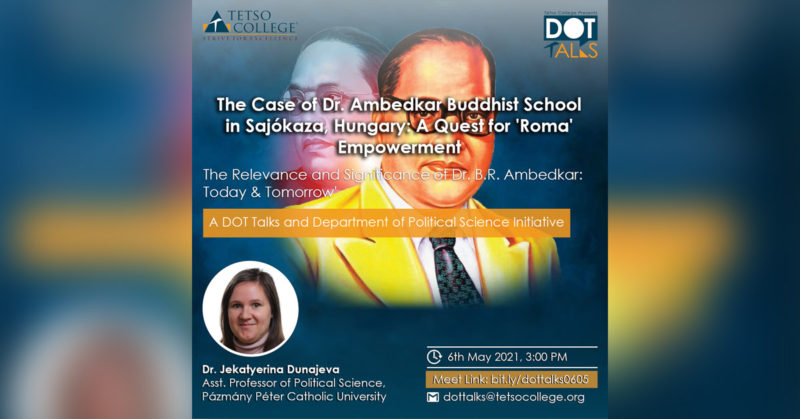Date : 6th May 2021
Time : 3:00 PM
Meet Link : bit.ly/dottalks0605
DOT Talks in collaboration with the Department of Political Science brings you an Online Lecture Series titled ‘The Relevance and Significance of Dr. B.R. Ambedkar: Today & Tomorrow’. The event will be graced by internationally recognized academicians, thinkers, and also our students who will be delivering consecutive lectures.
The third lecture in the series is called ‘The Case of Dr. Ambedkar Buddhist School in Sajókaza, Hungary: A Quest for ‘Roma’ Empowerment’ and will be delivered by Dr. Jekatyerina Dunajeva on 6th May 2021 at 3:00 PM.
Abstract: The Roma minority is found at the margins and fringes of most dimensions of Hungarian societal life. Segregation in the education system, at all levels, comprises one of those dimensions and is a reality that necessitates urgent attention. While de-segregation efforts have been attempted, the possibilities for change in the system as a whole have proven difficult, if not impossible. This is due to the normalised and deeply entrenched forms of discrimination and xenophobia that permeate urban and rural elementary and secondary school classrooms in Hungary. The small northern Hungarian town of Sajókaza is a microcosm of these pernicious issues. Where the Roma population, numbered at a third of the total town population, inhabits ghetto-like conditions and the Roma children are excluded from the local schooling system. Nevertheless, it is also a town where an alternative educational project for Roma integration has been successfully spearheaded. This paper describes and explores the critical pedagogies practiced by the Dr. Ambedkar Buddhist School (Dr. Ámbédkar Iskola) in Sajókaza. The local Jai Bhim network and the Dr. Ambedkar Buddhist School in particular present themselves as an educative body and community institution that aids, inspires and provides hope for a community otherwise disassembled and treated as outcasts by the village polity. The school uniquely blends Roma cultural elements with Dr. Ambedkar’s humanist ideology and Buddhist teachings. Building on fieldwork and a set of interviews conducted during the spring of 2016 with the school’s founders, this lecture will report the findings while highlighting the school’s mission to transform the social and economic situation of Roma children and teenagers through the teachings of Buddhist, critical pedagogue and visionary Dr. B. R. Ambedkar. In addition, the lecture will also provide insights into the ways in which local projects of inclusion and Roma empowerment are being deployed through alternative education arrangements and platforms, and how these have the potential of contributing to inclusive community development and long-term poverty alleviation.
About the Speaker: Jekatyerina Dunajeva is an Assistant Professor of Political Science at Pázmány Péter Catholic University, a Researcher at Central European University’s Center for Teaching and Learning, and a senior researcher at Public Policy and Management Institute, a Vilnius-based research and policy analysis center. In addition, Dr Dunajeva is one of the editors of the Critical Romani Studies Journal, hosted by CEU’s Romani Studies Program. She defended her PhD in Political Science at the University of Oregon (USA) in 2014. Throughout her career, Dr Dunajeva acted as a consultant, advisor, researcher and political analyst for international and local NGOs, think tanks and other institutions. Katya acted as an Advisory Board Member for Open Society Foundation’s (OSF) Youth Initiative (2012-2014) and a Consultant for OSF’s Education Support Board (2016). All of her work, both academic and applied, has revolved around the nexus of youth policy, education and social equality. Dr Dunajeva’s research has been published in several book chapters, peer-reviewed journals and edited volumes, and her manuscript is soon to be published by CEU Press. Her areas of expertise are Roma identity, education policy, integration, youth empowerment, as well as contemporary Russian and Hungarian politics.

